Energy Policy in the New Year
Air Date: Week of January 9, 2015
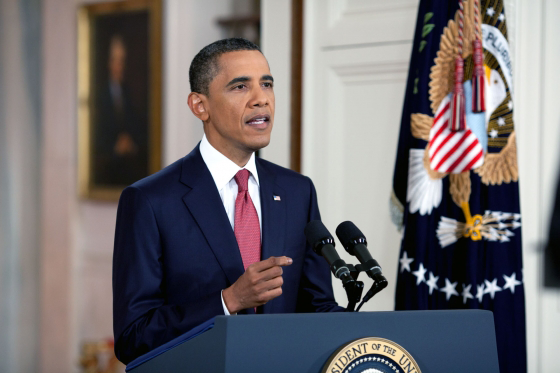
Aldy expects President Obama to, “come forward this year with a truly major, transformative regulation for the American power sector,” that will help curb greenhouse gas emissions. (Photo: Official White House Photo by Pete Souza)
With the Republicans now in the majority in both chambers in Congree, President Obama could find his agenda stymied at every turn. Harvard Public Policy Professor Joe Aldy sits down with host Steve Curwood to discuss the Obama administration’s energy and environment policy outlook for this term, including the future of the Keystone XL pipeline, fracking regulation and the possibility for bipartisan collaboration on transportation.
Transcript
CURWOOD: From the Jennifer and Ted Stanley Studios in Boston and PRI, this is Living on Earth. I’m Steve Curwood. A new year, a new Congress with both chambers now controlled by Republicans, but that doesn’t seem to have cowed President Obama. Despite the limited Capitol Hill support, he seems eager to fight for a legacy that includes action on global warming. For example, a top priority for Republicans is getting a bill onto the President’s desk that would approve the Keystone XL pipeline for carbon intensive Canadian tar sands oil, but White House press secretary Josh Earnest left no doubt what would happen to the measure if it got there.
EARNEST: The fact is this piece of legislation is not altogether different than legislation that was introduced in the last Congress. And you'll recall that we put out a statement of administration position indicating that the President would have vetoed, had that bill passed the previous Congress. And I can confirm for you that if this bill passes this Congress, the President wouldn't sign it either.
CURWOOD: Those words don’t surprise Joe Aldy, a former Obama White House aide and now an Assistant Professor of Public Policy at Harvard University. He says there are other factors at play when it comes to decisions over Keystone.
ALDY: We’ve seen a lot of change in the North American energy system over the last four, five years that we've been debating Keystone, where now the United States has become a much more significant producer of oil domestically. We're also consuming less and less oil because of fuel economy standards here in the United States. We're also now in a period where we see oil at very low prices; prices we've really not seen since the Great Recession.
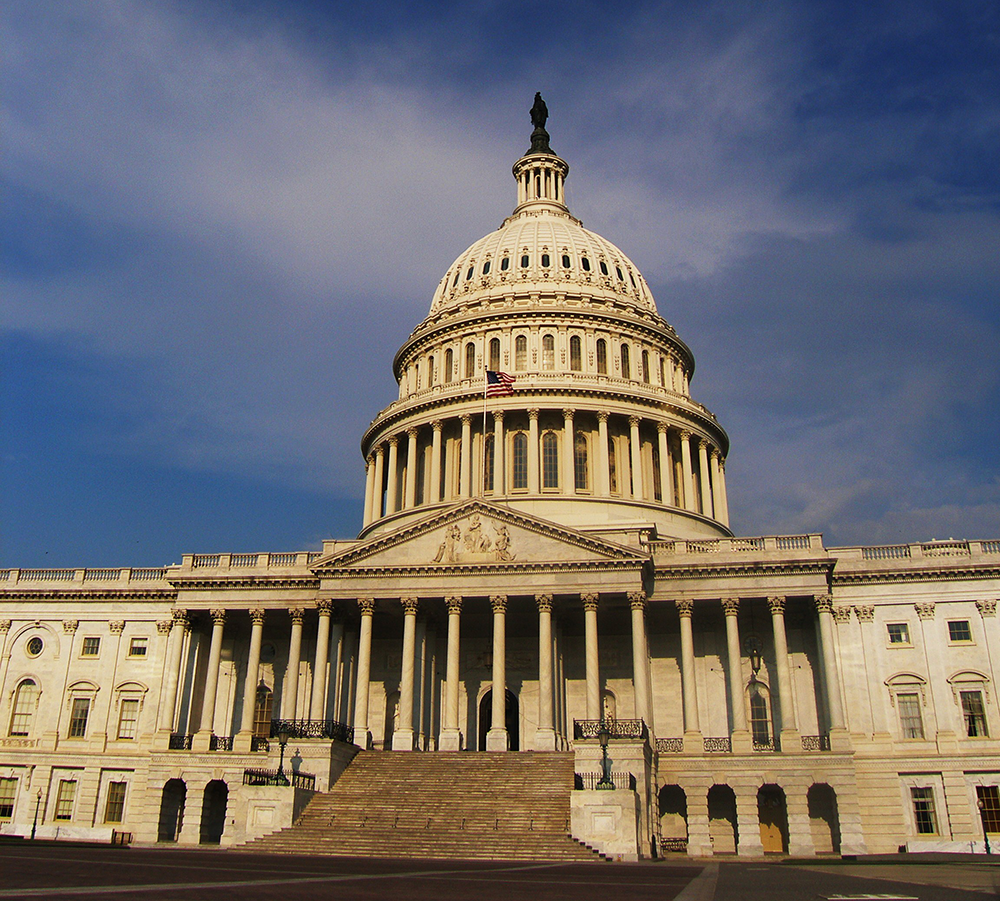
Transportation may provide an opportunity for bipartisan collaboration because of the nearly universal support for spending on roads, Aldy says. (Photo: Andy Withers; Flickr CC BY-NC-ND 2.0)
CURWOOD: Yes, you have to wonder how hard industry will be pushing for this thing when the price of oil is low as it is these days.
ALDY: I think when we look at the current oil market, there are a lot of people who have made investments, made bets in the more challenging oil to get out of the ground, and that includes the oil that's in Alberta. It also includes the shale oil development we've seen in the United States. Six months ago, when we saw oil at $100 dollars a barrel, those looked like good investments. Today, there's a lot of concern whether they can make money with current oil prices and likely near-term oil prices. So I think that will certainly influence how enthusiastic some will be about developing this pipeline and developing the resources in Canada.
CURWOOD: So, how much of this is a, well, frankly, a power struggle?
ALDY: I think a lot of Keystone has been about a power struggle between different political camps over a number of years that I think is larger than the impact it has on the environment or on jobs. We've seen this debate being played out as environment vs. jobs. I think it has a very modest impact on jobs. And I think there are other factors that will have a much bigger say on the environmental effect, such as: What is the price of oil and whether or not it's even economic to develop the resource, whether or not it's economic enough to move it out of Alberta by rail as a substitute to a pipeline which we've seen some of in recent years. These are going to be more important factors, what a couple of countries do in terms of addressing climate change more generally than whether we build this pipeline.
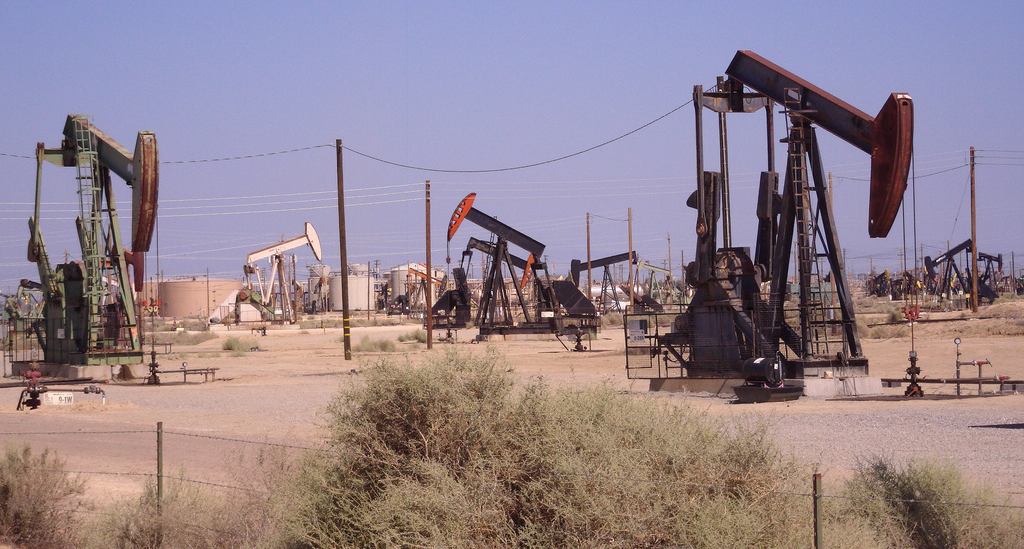
Domestic oil production has increased since the Keystone XL pipeline was first proposed over 6 years ago. (Photo: verifex; Flickr CC BY-NC 2.0)
CURWOOD: So, Keystone, perhaps, is more symbolic than substantive.
ALDY: I think that is a very fair description.
CURWOOD: Now, the EPA has been rolling out some fairly far-reaching rules under President Obama's watch on CO2, really based on the Supreme Court decision a number of years ago. Remind us what we saw at the end of last year and what could be coming from them in 2015 in terms of new rules?
ALDY: So, the President has put forward, through the Environmental Protection Agency, a proposal to address carbon dioxide emissions from the nation's power plants. This is the largest source of carbon dioxide emissions in the United States, and it's where we have a lot of opportunities to significantly reduce our emissions, especially by switching from the dirty fuels like coal into either renewables like wind and solar or to natural gas. So the President's proposal has been out for comment. EPA received more than a million comments on the regulation. It's getting a lot of attention, and EPA is scheduled to this summer to publish a final regulation. And this rule then, once it goes final, will then prompt the states to start to design their plans on how to implement that rule to reduce the emissions of CO2 in their power sectors.
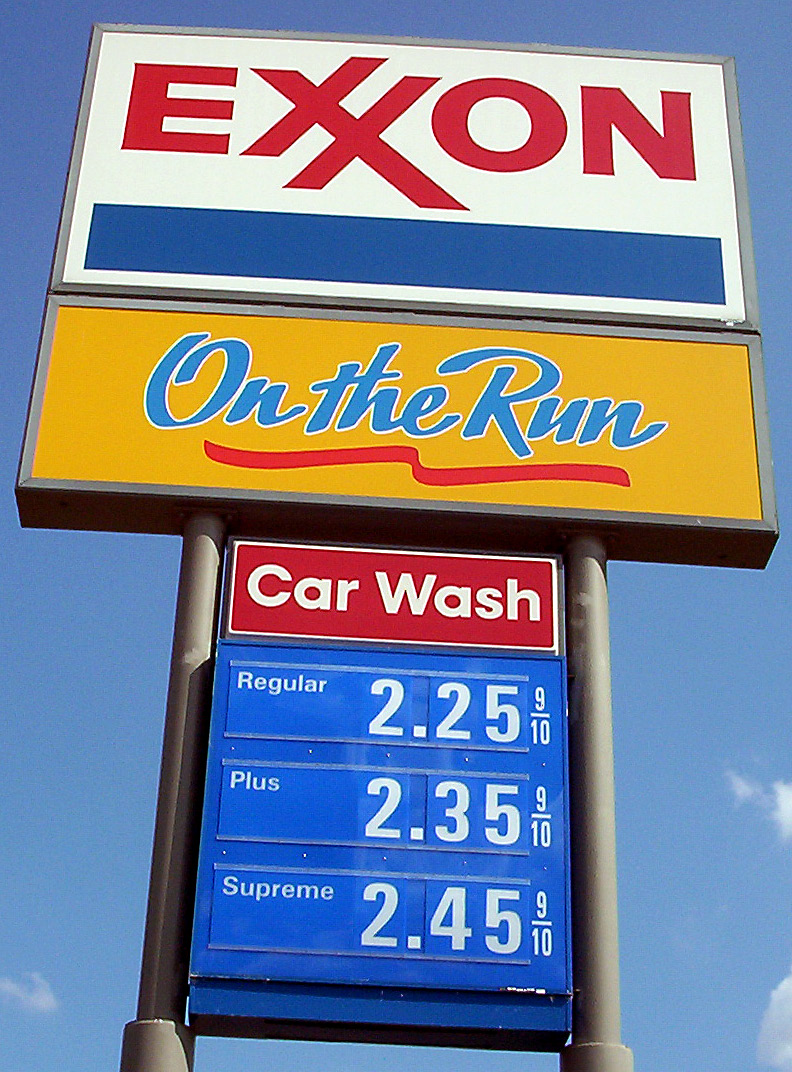
Oil prices have dropped to below $50 per barrel, calling into question the economic feasibility of the Keystone XL pipeline. (Photo: Philip Shoffner; Flickr CC BY 2.0)
CURWOOD: And once these rules come, what's the risk that they'll be a ton of lawsuits along with them?
ALDY: The probability is 100 percent that there will be lawsuits. In fact, there will likely be lawsuits filed from people on both sides of the issue, from both businesses and environmental groups that oppose this. You'll have some states that will be very supportive but may say they don't go far enough, and other states that will be very reluctant to implement the rules and may also try to challenge them as well. So, once the regulation is finalized, there will be a process to play out in the courts. We're likely to see a process play out in Congress as well. Congress does have the opportunity through the Congressional Review Act to review major regulations, and we've seen in the past how Congress has had a debate on climate-oriented regulations, the so-called "endangerment finding" that served as the basis for EPA to regulate carbon dioxide from automobiles and small trucks. You had a Republican in the Senate say, "Let's challenge this through the Congressional Review Act." That failed. I think you're likely to see a debate and an introduction of a challenge to the rule under the Congressional Review Act once it's finalized this year.
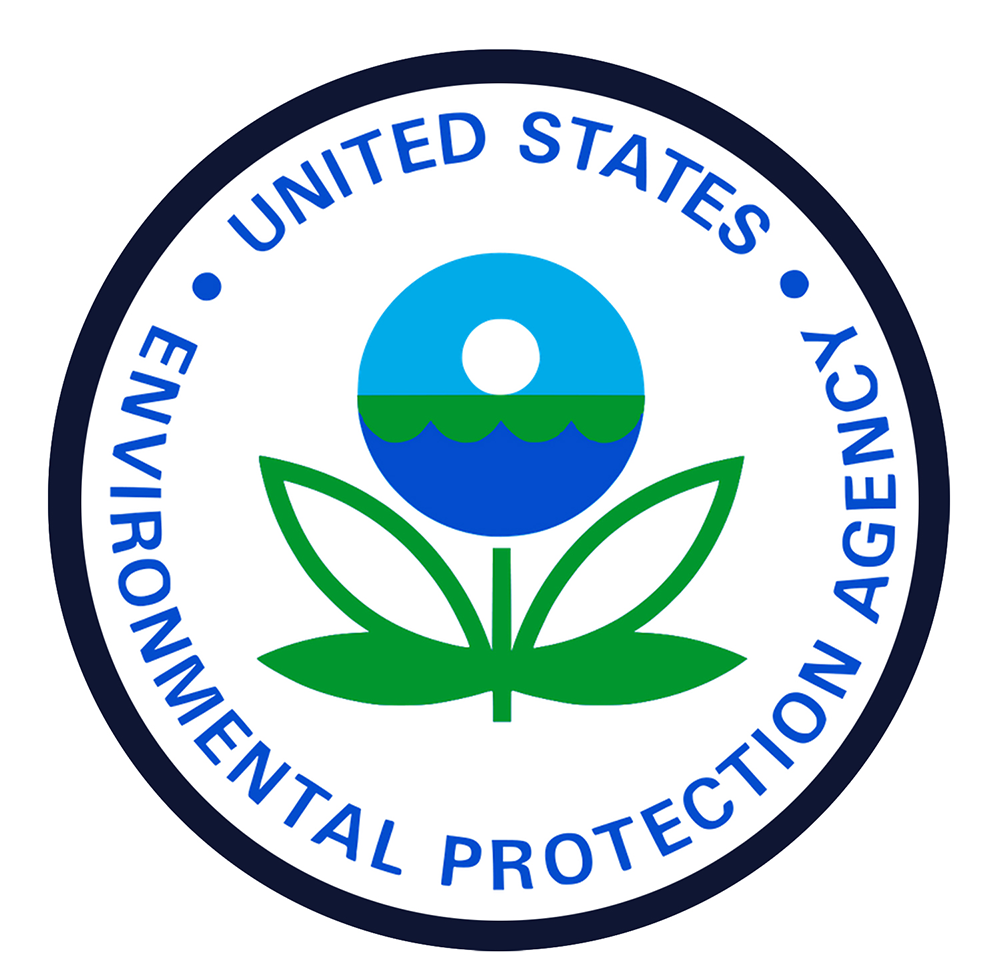
The EPA is currently evaluating public comments on President Obama’s proposal to regulate carbon dioxide emissions from power plants. (Photo: DonkeyHotey; Flickr CC BY 2.0)
CURWOOD: Let's talk about fracking. With the squeeze on coal-fired power plants, some folks are concerned that energy demand is shifting into natural gas. To what extent do you think the Obama Administration will look to regulate fracking in this next year?
ALDY: I think one area where the administration may move forward, and they've taken some action already to solicit input from the public and the industry, is to address the fugitive methane emissions associated with oil and gas activities. So, methane is a potent greenhouse gas, and there's a concern that sometimes when you're bringing oil and gas to the surface, not all of it stays in the pipe and some of it leaks out. And if you're drilling for gas, you don't really want a lot of fugitive emissions, because that's your money being leaked out in the air that otherwise you could sell in the market. So there is some incentive to try and minimize the extent of those emissions, but I think it's one area and it's really I think the last sort of single big category of emissions of greenhouse gases that the Obama Administration can tackle through existing authorities and in particular, under the Clean Air Act. The question on water impacts, local land use impacts—some of those end up being more of local kinds of issues, certainly on local land use, the impact on local infrastructure, something where the federal government really doesn't have much of a say or much in terms of authorities. On water, it's really kind of a mix between what the federal government can do and the states; we have very much a strong federal-state relationship when it comes to managing water. We may see some action there, but there may be more deference to what the states can do on the water front because the impacts do vary from state to state in a way that's distinct from the impact on air emissions where it's really sort of common regardless of where the drilling activity occurs.
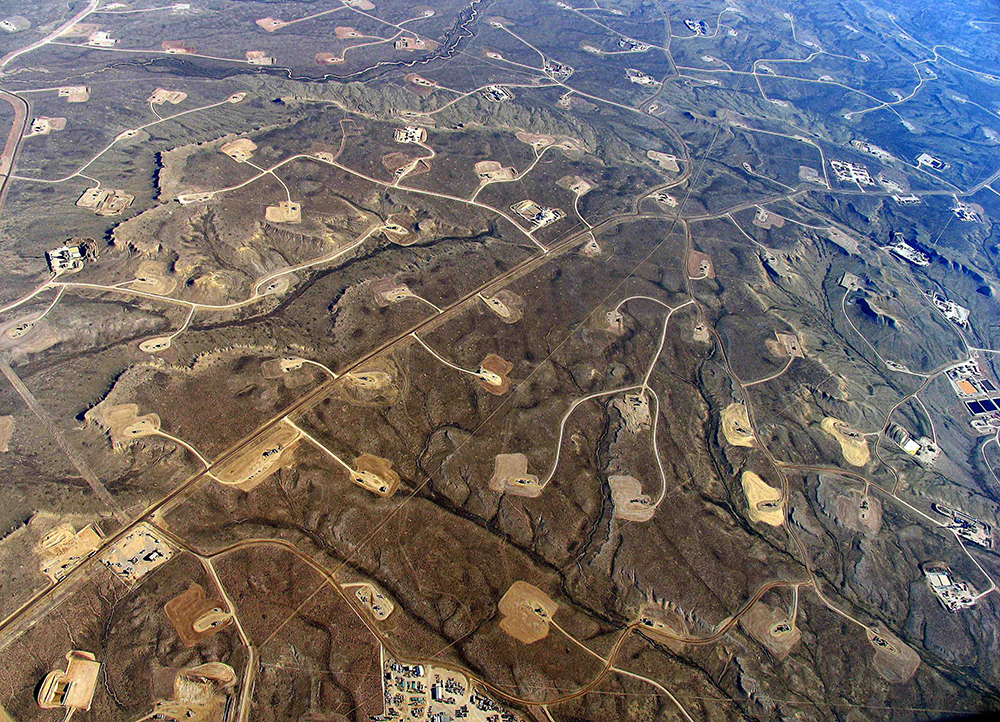
A dense web of roads, pipelines and wellpads connect fracking sites to refineries and distribution lines. Aldy says that while the Obama administration may address the fugitive methane emissions associated with fracking, the administration will most likely defer to states for regulation of fracking wastewater. (Photo: Simon Fraser University; Flickr CC BY 2.0)
CURWOOD: What do you think might be happening from the "unexpected" department in terms of legislation around the environment this year, legislation or new rules at the federal level?
ALDY: Well, I'm not sure there's a lot that's unexpected in terms of rules, in part, because of just the regulatory process works. Any regulation that goes through the federal government, first has to be proposed so that the public has an opportunity to comment on the regulation. Then, the regulatory agency takes that comment and then goes forward with the final regulation. On major rules, especially, say, the Environmental Protection Agency, it typically takes three to four years from beginning to end. So, if we knew that EPA was going to propose anything going forward that they plan to finalize before the end of the Obama Administration, it would already be out here. We'd already be well aware of it. So, I think in the climate context, the one that sticks out as they've talked about it, they've solicited feedback on different ways in which one can reduce methane emissions from oil and gas operations—they may propose in the near-term a regulation to address that, but other than that, I don't think there's a lot of surprises out there on what could be Executive Action just because the clock is starting to run out. In terms of legislation, this is something where I think it's potentially interesting because we've heard Republicans say they want to show how they can get things done, and the question is where are there opportunities for doing that. It's difficult to imagine a major environmental law reauthorization because I think the two parties are so far apart on the key issues, whether it's on clean air or clean water or the Endangered Species Act, but I think you might be able to see something on transportation. The other area where it may be interesting to see is whether or not there could be some kind of tax reform that may address things such as subsidies for fossil fuels. The challenge there is whether or not in reforming subsidies of fossil fuels, we also start to see the Republicans go after some of the tax credits that support wind and solar as well as energy efficiency investments. So that—I think that's one potential area if there's sort of traction on tax reform generally that we might see some reform of how the tax code affects our investment in different kinds of energy technologies.
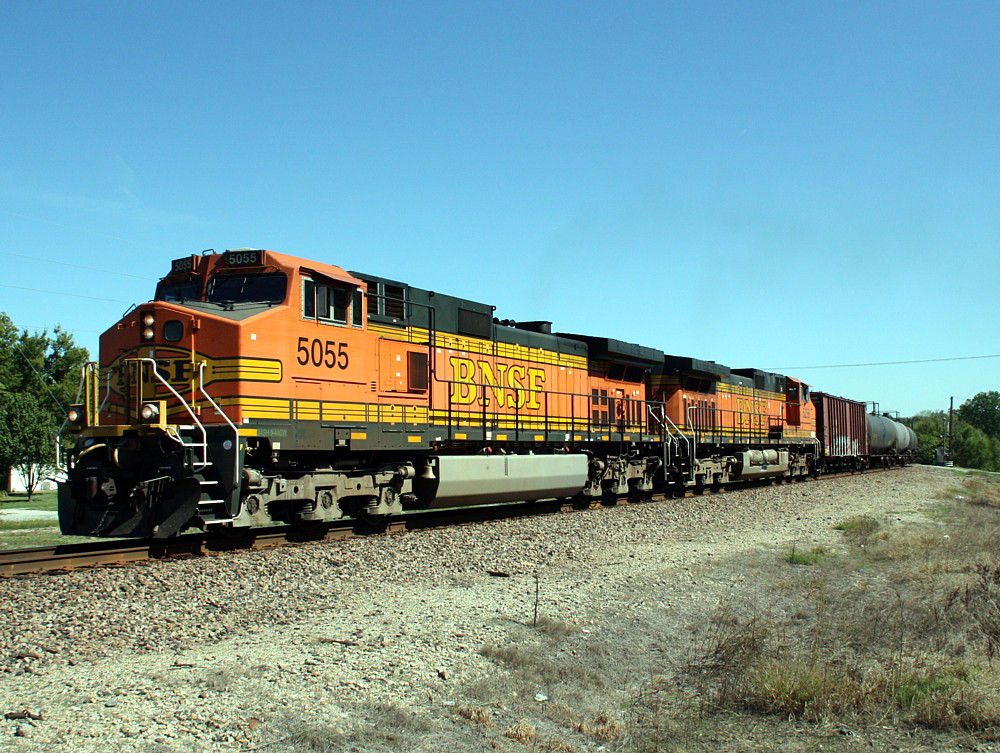
The economic profitability of delivering tar sands crude to refineries by rail may affect the need for the Keystone XL pipeline. (Photo: Terry Cantrell; Flickr CC BY-NC-SA 2.0)
CURWOOD: And what might be bipartisan about transportation?
ALDY: Well, we spend money on roads, and everyone likes to have money spent in their district on roads, so there at the end of the day, I think could be some support of an overall bill. The fact that the current bill runs out this year means there has to be some kind of legislative action on transportation, and the real question is whether or not there is something meaningful in terms of how we're going to finance road construction and mass transit investment going forward that may have a positive environmental benefit. Not just a positive environmental benefit, there's ways in which we can design the way we finance roads that also have a benefit in reducing congestion, which is, you know, people spending time sitting in their cars, increases frustration but also imposes costs on the economy. So I think there’s a possibility that if the two parties can be creative in how we address transportation, we can have a longer-term transportation bill that addresses the financing needs for highway construction, but also delivers some environmental benefits.
CURWOOD: So, Joe, what do you think the next couple of years are going to look like in terms of federal government dealing with environmental questions. We're going to see lots of fireworks, maybe another do-nothing Congress with lots of busy rulemaking veto-using President? Something else?
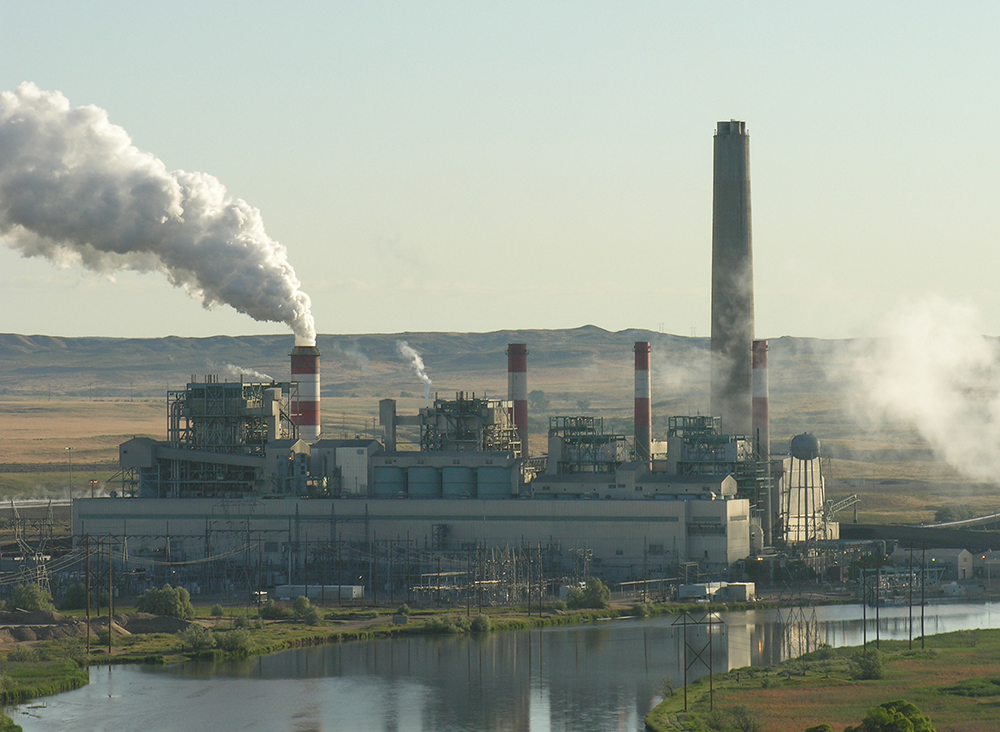
Power plants are the largest source of carbon dioxide emissions in the United States, and regulation targeting them can significantly reduce the US’ contribution to climate change. (Photo: Greg Goebel; CC BY-SA 2.0)
ALDY: On the energy and environment front, I'm not expecting much from Congress, but I expect the President to move forward in an aggressive manner with his existing authorities. I think we're going to see the President come forward this year with a truly major transformative regulation for the American power sector. I think that's going to set the foundation for the US to really have a meaningfully downward trajectory in terms of our greenhouse gas emissions, and I think it's something politically important for the President to use when he engages countries around the world to make sure that they move forward and undertake serious actions in their own countries to address greenhouse gas emissions. So I think that's going to be a major effort going forward for the President. I think it's something he's going to use as he works with other countries around the world in the run-up to Paris talks at the end of 2015, the next round of international climate negotiations, and I think that's really going to be - when we think about the action in Washington on energy and the environment - it's going to be there with the Executive Branch and it's going to be there with President Obama.
CURWOOD: Joe Aldy is an Assistant Professor of Public Policy at Harvard University. Thanks so much, Joe.
ALDY: Thank you, Steve.
Links
White House briefing, which addressed its position on Keystone XL
Living on Earth wants to hear from you!
Living on Earth
62 Calef Highway, Suite 212
Lee, NH 03861
Telephone: 617-287-4121
E-mail: comments@loe.org
Newsletter [Click here]
Donate to Living on Earth!
Living on Earth is an independent media program and relies entirely on contributions from listeners and institutions supporting public service. Please donate now to preserve an independent environmental voice.
NewsletterLiving on Earth offers a weekly delivery of the show's rundown to your mailbox. Sign up for our newsletter today!
 Sailors For The Sea: Be the change you want to sea.
Sailors For The Sea: Be the change you want to sea.
 The Grantham Foundation for the Protection of the Environment: Committed to protecting and improving the health of the global environment.
The Grantham Foundation for the Protection of the Environment: Committed to protecting and improving the health of the global environment.
 Contribute to Living on Earth and receive, as our gift to you, an archival print of one of Mark Seth Lender's extraordinary wildlife photographs. Follow the link to see Mark's current collection of photographs.
Contribute to Living on Earth and receive, as our gift to you, an archival print of one of Mark Seth Lender's extraordinary wildlife photographs. Follow the link to see Mark's current collection of photographs.
 Buy a signed copy of Mark Seth Lender's book Smeagull the Seagull & support Living on Earth
Buy a signed copy of Mark Seth Lender's book Smeagull the Seagull & support Living on Earth

